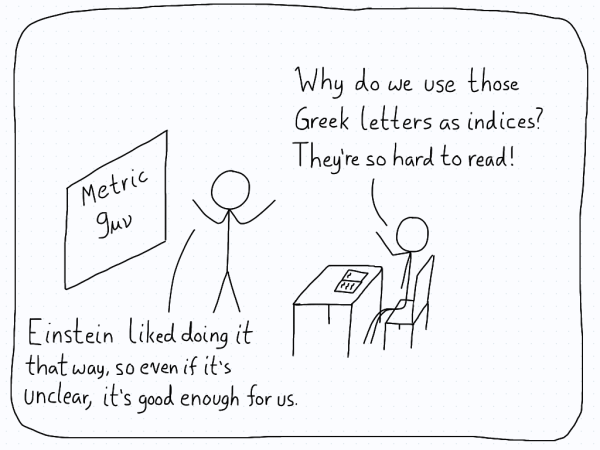By Convention
It’s game seven of the Stanley Cup Finals, and both teams are about to get on the ice. The camera hovers around them, and you notice that everyone has a complex array of fist bumps, arm movements, and rituals. Some even have smelling salts that they wave in front of them before the match starts. Superstition is rampant, and you roll your eyes as a scientist, knowing that it’s all nonsense.
Except that it isn’t complete nonsense. Sure, there’s no supernatural effect from any of these actions, but they do serve a purpose: convention. By doing the same thing every game, the players are able to calm themselves and focus on the match ahead. By repeating the same actions all the time, it becomes a new normal.
This is hardly a phenomenon of professional hockey, nor is it exclusive to sports. Convention is present in all aspects of our lives, and science is not immune to it. In particular, the field of physics is filled with conventions. You can barely wade into a few pages of a textbook without encountering some (often contrived) convention.
In and of itself, there’s nothing bad with convention in science. It makes things standard so that everyone has an understanding of how things are done. Unfortunately, physics is riddled with historical conventions. The problem with history is that a lot of it was wrong or misguided. As such, we end up having terminology that doesn’t even reflect the actual phenomena, such as cosmic rays, which aren’t photons but are particles.
This can be confusing enough, but there are also historical conventions in terms of notation, even when legibility is reduced. By honouring historical convention, you end up with ridiculous situations like this:

The sane response would be to say, “Alright, let’s get rid of all this bad notation and terminology. Let’s update to the twenty-first century!”
However, there’s an additional problem. You notice these crazy conventions when you’re a student. It’s obvious then, but your professors say that you just have to suck it up and get used to it. Not having much of a choice, you accept it. Fast forward ten years, and you will end up telling your students that they need to get used to convention. After working with the convention for years, you won’t find that there’s anything strange with it, while the young students will find it weird.
Just like that, the cycle continues.
Breaking these historical conventions isn’t easy. It’s a mixture of not wanting to ruin the old notation in the literature and being “used” to the normal way to do things.
I have a different view. We are scientists, which means we shouldn’t be bogged down by historical baggage that has pervaded the field in the past. If a new convention is needed, we should step up to make that change. It might be slow, it might not work, but it’s worth trying. Not for us, but for our students later on.
I know that I won’t be writing those Greek indices on my tensors anytime soon.